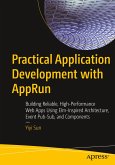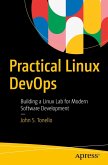Cyberattacks are becoming more commonplace and the Open Web Application Security Project (OWASP), estimates 94% of sites have flaws in their access control alone. Attacks evolve to work around new defenses, and defenses must evolve to remain effective. Developers need to understand the fundamentals of attacks and defenses in order to comprehend new techniques as they become available. This book teaches you how to write secure web applications.
The focus is highlighting how hackers attack applications along with a broad arsenal of defenses. This will enable you to pick appropriate techniques to close vulnerabilities while still providing users with their needed functionality.
Topics covered include:
A framework for deciding what needs to be protected and how stronglyConfiguring services such as databases and web serversSafe use of HTTP methods such as GET, POST, etc, cookies and use of HTTPSSafe REST APIsServer-side attacks and defenses such as injection and cross-site scriptingClient-side attacks and defenses such as cross-site request forgerySecurity techniques such as CORS, CSPPassword management, authentication and authorization, including OAuth2Best practices for dangerous operations such as password change and resetUse of third-party components and supply chain security (Git, CI/CD etc)
What You'll Learn
Review the defenses that can used to prevent attacksModel risks to better understand what to defend and howChoose appropriate techniques to defend against attacksImplement defenses in Python/Django applications
Who This Book Is For
Developers who already know how to build web applications but need to know more about securityNon-professional software engineers, such as scientists, who must develop web tools and want to make their algorithms available to a wider audience.Engineers and managers who are responsible for their product/company technical security policy
The focus is highlighting how hackers attack applications along with a broad arsenal of defenses. This will enable you to pick appropriate techniques to close vulnerabilities while still providing users with their needed functionality.
Topics covered include:
A framework for deciding what needs to be protected and how stronglyConfiguring services such as databases and web serversSafe use of HTTP methods such as GET, POST, etc, cookies and use of HTTPSSafe REST APIsServer-side attacks and defenses such as injection and cross-site scriptingClient-side attacks and defenses such as cross-site request forgerySecurity techniques such as CORS, CSPPassword management, authentication and authorization, including OAuth2Best practices for dangerous operations such as password change and resetUse of third-party components and supply chain security (Git, CI/CD etc)
What You'll Learn
Review the defenses that can used to prevent attacksModel risks to better understand what to defend and howChoose appropriate techniques to defend against attacksImplement defenses in Python/Django applications
Who This Book Is For
Developers who already know how to build web applications but need to know more about securityNon-professional software engineers, such as scientists, who must develop web tools and want to make their algorithms available to a wider audience.Engineers and managers who are responsible for their product/company technical security policy








